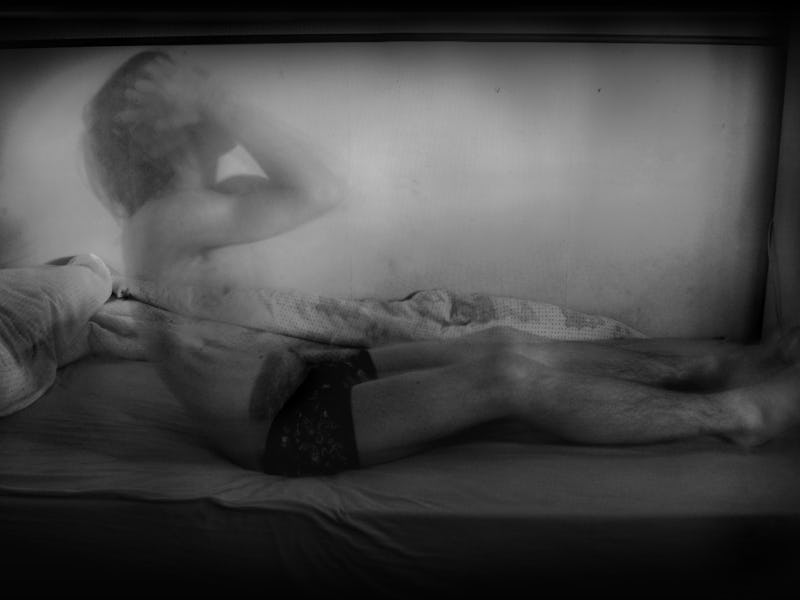Lucid Dreaming Will End PTSD When Scientists Restrain Our Wild Subconscious
Having access to our normal cognitive abilities could allow us to beat back our demons every night and turn around a public health crisis.

War comes home and, more often than not, works the night shift. Up to 96 percent of PTSD sufferers endure vivid nightmares that force them to relive traumatic events or the trauma independent of the events. These dreams turn sleep into a realm of fear, not solace, and they cling like memories despite not being real. The only way to overcome the impotence of dream fear is through dream empowerment. Lucid dreaming is the obvious prescription: It’s just not one science can offer — yet. And, according to lucid dream expert Brigitte Holzinger, New Age connotations currently make funding nearly impossible to secure.
As Director of Vienna’s Institute of Consciousness and Dream Research, Holzinger is no stranger to popular, if misguided, preconceptions. Despite her training in psychology and psychotherapy, she’s had to work around the presumptions of funders officially referring to her specialty as “cognition in sleep” because, she told Inverse, reviewers don’t think “lucid dreaming” sounds very scientific. She’s probably right. But that doesn’t mean that it isn’t.
The existing research suggests that the cognitive tools you reach for in waking life — rationality, decisiveness, and choice — are, in theory, accessible in the lucid state. Thus, nightmares can freely be dismantled or at least escaped. At least, that’s how the theory goes. Lucid dreams have been documented by conscious sleepers like St. Augustine as far back as the year 415, but they’ve remained mysterious because they’re really hard to induce, let alone assess for utility. Still, their potential to treat PTSD is too helpful to ignore, which makes it all the more frustrating when funding is withheld for more “mainstream” therapies.
“Lucid dreaming is pioneer research and work, and often pioneers are operating outside the mainstream,” says Holzinger, who admits that collaborating with experts in more established fields has been necessary to advance her work. “I have always taken care to be thorough. I was lucky that I was able to collaborate with very competent and experienced, sometimes also renowned colleagues, from biology to sleep medicine.”
Lucid dreaming therapy is still in its infancy, but the preliminary results are promising. A 1997 paper was the first to suggest that lucid dreaming could have therapeutic value in treating nightmares. In 2006, a pilot study concluded that lucid dreaming could reduce the frequency of nightmares and suggested that “changing the nightmare-storyline” was the crucial part. More recently, in 2013, a team of Brazilian scientists suggested that lucid dreaming couldn’t just treat nightmares but also provide a window into other states of altered consciousness.
There’s work to be done, especially in terms of methodology. Figuring out whether lucid dreams are helpful isn’t possible if test subjects can’t lucid dream. Currently, researchers use methods like wake-induced lucid dreaming — or WILD — in which subjects empty their mind through meditation before sleep. Other protocols are variations on the routine of waking up, visualizing a dream, and returning to sleep with that rehearsal in mind. Unfortunately, these methods don’t produce very consistent results.
But because lucid dreaming could allow nightmare sufferers to rationalize that what’s happening isn’t real, consciously alter a dream, or simply induce waking, the research is too promising not to pursue. And sleep researchers have reason to be optimistic: A new study, published in 2014 in Nature Neuroscience, reported that electrically stimulating the brain’s frontal lobe, an area associated with the lucid state, could induce lucid dreams without resorting to any of the old methods.
Holzinger is optimistic but is resignedly aware of the science community’s hostility toward fringe ideas. “As rewarding as it is in so many ways to devote your work to lucid dreaming, financially it is not,” she says. “There still is so much to be found out about, but to make a living on that alone is impossible in Europe, let alone finding research money.” She’s folded lucid dreaming into work on broader topics in sleep research, including a nightmare-treating technique she calls “sleep coaching.”
As sleep deprivation becomes a chronic public health issue, protecting the sanctity of what little sleep we get is paramount. That means getting serious about rest and serious about dreams. Holzinger should be able to say what she studies and she shouldn’t have to worry too much about funding. Lucid dreaming has profound promise, and it’s the least we can do for our veterans — not to mention ourselves.